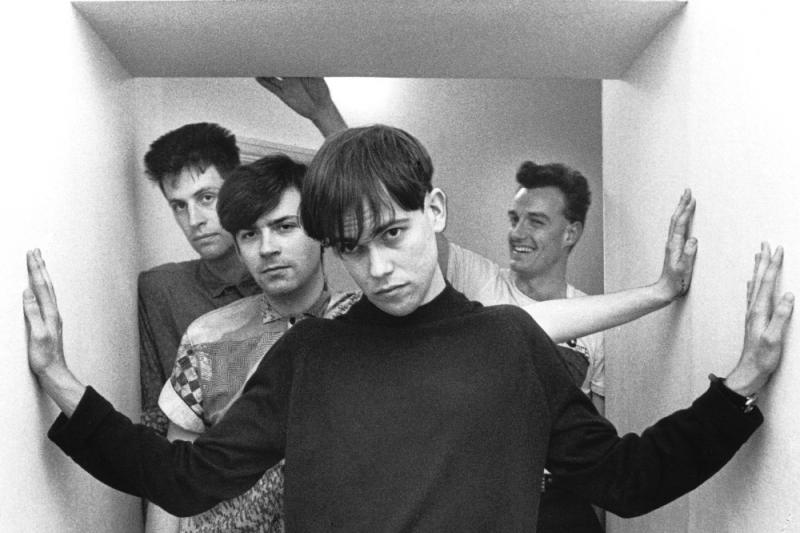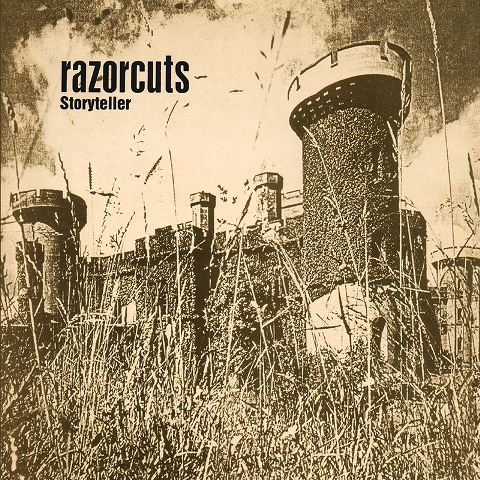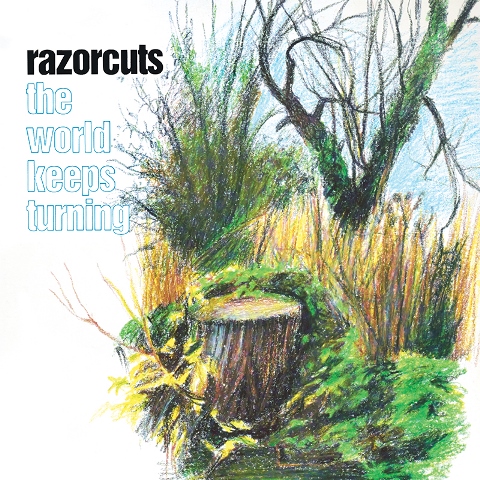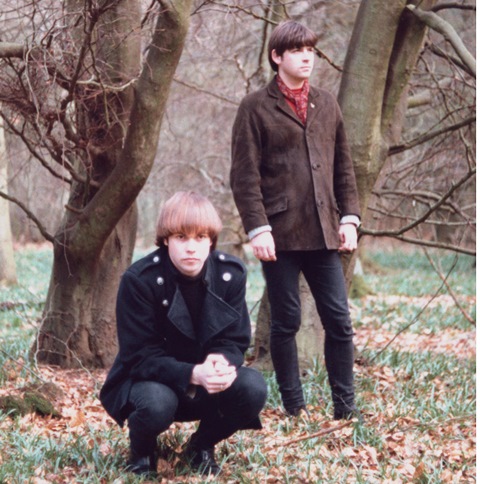Reissue CDs Weekly: Razorcuts - Storyteller, The World Keeps Turning | reviews, news & interviews
Reissue CDs Weekly: Razorcuts - Storyteller, The World Keeps Turning
Reissue CDs Weekly: Razorcuts - Storyteller, The World Keeps Turning
Definitive overview of the UK indie-popsters reveals their rapid development

Razorcuts formed after Tim Vass discovered Alan McGee’s Living Room club. In the booklet accompanying the reissue of his band’s first album Storyteller, Vass says of the weekly London promotion that “The headline act would often be someone like The Membranes or Alternative TV, but it was the unknown support acts that blew me away: The Jasmine Minks, The June Brides, The Loft.”
Suitably inspired, Vass brought his friend and fellow Luton-dweller Gregory Webster along to The Living Room and Razorcuts were soon in business. Both were previously in the Television Personalities influenced outfit Cinematics. They moved to London after resolving to form a new band and quickly recruited NME staffer David Swift as their drummer: he also played with McGee’s band Biff Bang Pow! Razorcuts’s first single, “Big Pink Cake” / “I’ll Still Be There” arrived in May 1986. It was produced by former TVP Joe Foster, who also worked with bands on McGee’s Creation label, notably The Jesus and Mary Chain, and also recorded for the imprint as Slaughter Joe.
 While Razorcuts – their name came from a Buzzcocks song – were motivated by and integral to a particular zeitgeist, the records following “Big Pink Cake’s” Buzzcocks-ey, fuzz-pop blast tell a different story – one of a band which swiftly found its own path. Despite line-up changes, the creative core of Vass and Webster were constants.
While Razorcuts – their name came from a Buzzcocks song – were motivated by and integral to a particular zeitgeist, the records following “Big Pink Cake’s” Buzzcocks-ey, fuzz-pop blast tell a different story – one of a band which swiftly found its own path. Despite line-up changes, the creative core of Vass and Webster were constants.
The band’s two albums, February 1988’s Storyteller and February 1989’s The World Keeps Turning are reissued as vinyl only double-LP sets. With each, originally issued by Creation, the second record collects bonus tracks from non-album singles and EPs, spreading the entire Razorcuts catalogue across both releases. There are more bonuses than the 2010 CD editions. The new reissues come with illustrated inserts with notes from Vass and Webster and the resultant overview is intriguing.
Of Storyteller, Webster says “[I was] besotted with mid-’60s folk rock – The Beau Brummels, The Turtles, Hearts & Flowers. You can hear the fingerprints all over that record.” Of his lyrics for the album, Vass adds “I was probably influenced to some extent by early Pete Townshend, The Kinks, that whole idea of small vignettes of English life. Englishness was very important; I tried to only use the kinds of words and phrases that I would use in real life – to quote Ray Davies, ‘the English-speaking vernacular.’” This push-pull between American and British influences helps define Razorcuts, as does their contemporaneous grounding in exactly what was going on at the grassroots of one strand of UK indie rock.
 Looking back on second album The World Keeps Turning, Vass reflects “we made a conscious effort to branch out a little. The plan was to continue producing thoughtful idiosyncratic songs with catchy choruses, whilst allowing ourselves to take on board a wider range of influences from our ever-growing record collections. For a while afterwards I thought that the album was stylistically all over the place, but listening to it now it sounds pretty coherent. By the end of the ‘80s, I wasn’t really listening to any current music at all. I had no interest in the baggy bands. I hated dance music – especially acid house, which I thought was just laughable. Grunge was just starting to happen, and I hated that as well. I was obsessed with searching out obscure psychedelia, glam rock, and acid folk from the past.”
Looking back on second album The World Keeps Turning, Vass reflects “we made a conscious effort to branch out a little. The plan was to continue producing thoughtful idiosyncratic songs with catchy choruses, whilst allowing ourselves to take on board a wider range of influences from our ever-growing record collections. For a while afterwards I thought that the album was stylistically all over the place, but listening to it now it sounds pretty coherent. By the end of the ‘80s, I wasn’t really listening to any current music at all. I had no interest in the baggy bands. I hated dance music – especially acid house, which I thought was just laughable. Grunge was just starting to happen, and I hated that as well. I was obsessed with searching out obscure psychedelia, glam rock, and acid folk from the past.”
Listening to both albums now, it’s clear Razorcuts developed fast and in real time: each record was a step on from what came before. The sharpness of the brittle first single and its follow-up EP was soon modulated in favour of an increasing focus on the nature of the song and a burgeoning reflectiveness, culminating in the frequently affecting The World Keeps Turning. The assured second album’s lyrics indicate Vass’s yen for the pastoralism signposted by the album’s cover image.
Webster says “A consciousness of our relationship with nature had developed over time in the music and imagery. Tim and I first met within a local punk scene that included an active Hunt Sab community, and Tim subsequently led the way in activism, diving into local and national environmental campaigns. We both developed heavy donation habits, giving to a wide range of environmental organisations including Greenpeace, Compassion In World Farming, WWF and Friends of the Earth.”
 Musically, the mid-point Razorcuts shares a 12-string-guitar-driven ethos with the Mark One Primal Scream. There’s hints of “Sally Cinnamon” Stone Roses too, but that’s at a remove as Primal Scream rather than Razorcuts had impacted on The Stone Roses. Razorcuts though pushed forward until the point they could no longer take what they were doing further. The band called it a day in 1990.
Musically, the mid-point Razorcuts shares a 12-string-guitar-driven ethos with the Mark One Primal Scream. There’s hints of “Sally Cinnamon” Stone Roses too, but that’s at a remove as Primal Scream rather than Razorcuts had impacted on The Stone Roses. Razorcuts though pushed forward until the point they could no longer take what they were doing further. The band called it a day in 1990.
These reissues are definitive. However, they are less user-friendly than they could be as the album-two bonus tracks in both cases are not sequenced in release order meaning it's hard to get a feel for the band's development, and the annotation does not specify which records the tracks are drawn from. To find out the sources, a band timeline in The World Keeps Turning’s booklet needs constant reference. There is no credit for the mastering which employs a regularising approach to levels and EQ throughout, giving a uniform sonic experience suggesting that a one-size-fits-all digital process was undertaken. It would have been nice to hear the differing dynamic of tracks from individual singles and EPs: to hear the differences in approach as the band evolved.
What’s brought home by both albums is that balancing vibrancy with thoughtfulness helped Razorcuts rapidly become more than the sum of their influences. This was no cookie-cutter indie band. Hopefully, these reissues will add to their profile.
- Next Week: Rock ’n roll Zelig Philip Rambow’s The Rebel Kind Anthology 1972–2020
- More reissue reviews on theartsdesk
- Kieron Tyler’s website
Explore topics
Share this article
The future of Arts Journalism
You can stop theartsdesk.com closing!
We urgently need financing to survive. Our fundraising drive has thus far raised £49,000 but we need to reach £100,000 or we will be forced to close. Please contribute here: https://gofund.me/c3f6033d
And if you can forward this information to anyone who might assist, we’d be grateful.

Subscribe to theartsdesk.com
Thank you for continuing to read our work on theartsdesk.com. For unlimited access to every article in its entirety, including our archive of more than 15,000 pieces, we're asking for £5 per month or £40 per year. We feel it's a very good deal, and hope you do too.
To take a subscription now simply click here.
And if you're looking for that extra gift for a friend or family member, why not treat them to a theartsdesk.com gift subscription?
more New music
 Lily Allen's 'West End Girl' offers a bloody, broken view into the wreckage of her marriage
Singer's return after seven years away from music is autofiction in the brutally raw
Lily Allen's 'West End Girl' offers a bloody, broken view into the wreckage of her marriage
Singer's return after seven years away from music is autofiction in the brutally raw
 Music Reissues Weekly: Joe Meek - A Curious Mind
How the maverick Sixties producer’s preoccupations influenced his creations
Music Reissues Weekly: Joe Meek - A Curious Mind
How the maverick Sixties producer’s preoccupations influenced his creations
 Pop Will Eat Itself, O2 Institute, Birmingham review - Poppies are back on patrol
PWEI hit home turf and blow the place up
Pop Will Eat Itself, O2 Institute, Birmingham review - Poppies are back on patrol
PWEI hit home turf and blow the place up
 'Fevereaten' sees gothic punk-metallers Witch Fever revel in atmospheric paganist raging
Second album from heavy-riffing quartet expands sonically on their debut
'Fevereaten' sees gothic punk-metallers Witch Fever revel in atmospheric paganist raging
Second album from heavy-riffing quartet expands sonically on their debut
 theartsdesk Q&A: Soft Cell
Upon the untimely passing of Dave Ball we revisit our September 2018 Soft Cell interview
theartsdesk Q&A: Soft Cell
Upon the untimely passing of Dave Ball we revisit our September 2018 Soft Cell interview
 Demi Lovato's ninth album, 'It's Not That Deep', goes for a frolic on the dancefloor
US pop icon's latest is full of unpretentious pop-club bangers
Demi Lovato's ninth album, 'It's Not That Deep', goes for a frolic on the dancefloor
US pop icon's latest is full of unpretentious pop-club bangers
 Yazmin Lacey confirms her place in a vital soul movement with 'Teal Dreams'
Intimacy and rich poetry on UK soul star's second LP
Yazmin Lacey confirms her place in a vital soul movement with 'Teal Dreams'
Intimacy and rich poetry on UK soul star's second LP
 Solar Eyes, Hare & Hounds, Birmingham review - local lads lay down some new tunes for a home crowd
Psychedelic indie dance music marinated in swirling dry ice
Solar Eyes, Hare & Hounds, Birmingham review - local lads lay down some new tunes for a home crowd
Psychedelic indie dance music marinated in swirling dry ice
 The Lemonheads' 'Love Chant' is a fine return to form
Evan Dando finally gets back in the saddle with an album of new tunes
The Lemonheads' 'Love Chant' is a fine return to form
Evan Dando finally gets back in the saddle with an album of new tunes
 Music Reissues Weekly: Evie Sands - I Can’t Let Go
Diligent, treasure-packed tribute to one of Sixties’ America’s great vocal stylists
Music Reissues Weekly: Evie Sands - I Can’t Let Go
Diligent, treasure-packed tribute to one of Sixties’ America’s great vocal stylists
 'Deadbeat': Tame Impala's downbeat rave-inspired latest
Fifth album from Australian project grooves but falls flat
'Deadbeat': Tame Impala's downbeat rave-inspired latest
Fifth album from Australian project grooves but falls flat
 Heartbreak and soaring beauty on Chrissie Hynde & Pals' Duets Special
The great Pretender at her most romantic and on the form of her life
Heartbreak and soaring beauty on Chrissie Hynde & Pals' Duets Special
The great Pretender at her most romantic and on the form of her life

Add comment